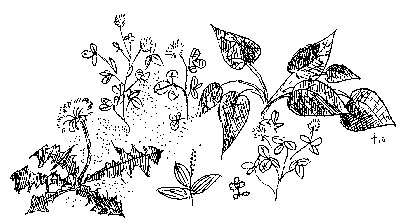 |
| Toki Oshima illustration. |
By C. J. Walke
The 2012 orchard season ran the spectrum of crop yields across the state, with some orchards experiencing total crop loss due to freezing temperatures at the end of April, while others had a typical year. In the MOFGA orchards, three consecutive nights between 26 and 29 F during the last weekend in April caught plums in bloom, pears about to pop and apples mostly at pink – all stages that are extremely vulnerable to freezing temperatures, resulting in the loss of fruit buds.
The lack of fruit gave me plenty of time to crawl beneath the trees, pull weeds, spread compost and hunt down elusive and persistent borers. I planted more comfrey around young trees to help build soil calcium reserves, sowed red clover to satisfy the long tongues of the bumble bees, and sweet alyssum to provide nectar for beneficials until its blossoms fade under a hard November frost.
All season I thought of how changes in weather patterns wiped out my harvest plans, how these fluctuations may become the new “normal” and how change affects us all, from the buds on the tree to the larva beneath the bark to the man in the orchard, dreaming of delicious fruit but reaping only patience.
Often, the trials of one year are followed with rewards for humility and perseverance the next, while we continually grow and learn and adapt. The trees in the orchard will be there for many years, with empty limbs followed by bumper crops, and the bark of time circling thicker and thicker around woody frames. Standing strong, though often hunched, weathering the storms and glistening in the sun, the trees celebrate life, regardless of loss, focusing on survival and renewing our joy of hope as dormant buds swell and bright new blossoms pop.
The trees endure many changes throughout their lives, mostly due to the intentions we place upon them, pruning off limbs in the cold March wind, grafting new wood onto old, or picking their season-long work from their grasp for a few minutes of sweet delight. They withstand remarkable interference, either at the hands of nature or our own meddling, and still produce fruit. There’s a lot to learn here.
Rough seasons give rise to second thoughts, to asking ourselves why we toil and struggle each day. Why do we rise at dawn to coat the tree with clay or scout for pests to squish, when we know the next rain will wash away our efforts, requiring reapplication, or the next wind will blow in a new round of hungry pests looking to pierce or chew or sting or suck. Do we do this for reward, for the fruits of our labors? I think that’s part of the story, but it’s really about the process, the growing, day by day and bud by bud; about being rooted in the soil, nurturing seeds or cells, under the sun or in the rain, celebrating life, loss and renewal with every swollen bud.
If anything, days in the orchard give us time to get carried away with introspective thoughts or lofty dreams, but always return us to the sanctuary of the soil. Terra firma. Boots on the ground. We are all fighting the good fight for organic foods, a clean environment and healthy kids. If you’re reading this, you’re part of the family that has fought for more than 40 years to make a vision become reality, despite struggles and cynics, opposition and fools. So thank you for growing. And how about them apples, when they fruit?
C.J. Walke is MOFGA’s organic orchardist and librarian. You can address your orcharding questions to him at 568-4142 or [email protected].
